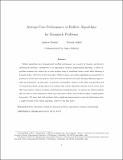Average-Case Performance of Rollout Algorithms for Knapsack Problems
Author(s)
Mastin, Andrew; Jaillet, Patrick
DownloadJaillet_Average-case.pdf (615.9Kb)
OPEN_ACCESS_POLICY
Open Access Policy
Creative Commons Attribution-Noncommercial-Share Alike
Terms of use
Metadata
Show full item recordAbstract
Rollout algorithms have demonstrated excellent performance on a variety of dynamic and discrete optimization problems. Interpreted as an approximate dynamic programming algorithm, a rollout algorithm estimates the value-to-go at each decision stage by simulating future events while following a heuristic policy, referred to as the base policy. While in many cases rollout algorithms are guaranteed to perform as well as their base policies, there have been few theoretical results showing additional improvement in performance. In this paper, we perform a probabilistic analysis of the subset sum problem and 0–1 knapsack problem, giving theoretical evidence that rollout algorithms perform strictly better than their base policies. Using a stochastic model from the existing literature, we analyze two rollout methods that we refer to as the exhaustive rollout and consecutive rollout, both of which employ a simple greedy base policy. We prove that both methods yield a significant improvement in expected performance after a single iteration of the rollout algorithm, relative to the base policy.
Date issued
2014-07Department
Massachusetts Institute of Technology. Department of Electrical Engineering and Computer Science; Massachusetts Institute of Technology. Laboratory for Information and Decision SystemsJournal
Journal of Optimization Theory and Applications
Publisher
Springer-Verlag
Citation
Mastin, Andrew, and Patrick Jaillet. “Average-Case Performance of Rollout Algorithms for Knapsack Problems.” Journal of Optimization Theory and Applications 165, no. 3 (July 26, 2014): 964–984.
Version: Author's final manuscript
ISSN
0022-3239
1573-2878